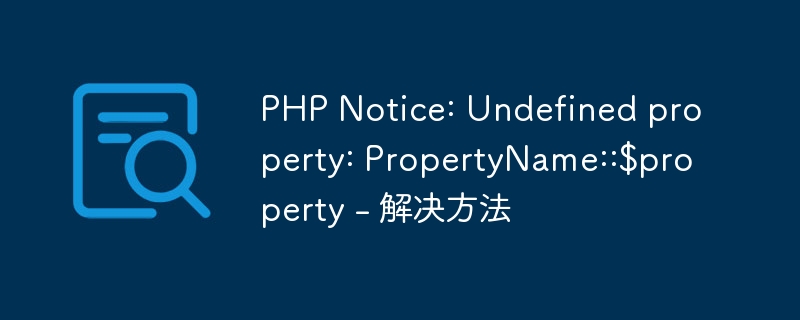Home >Backend Development >PHP Tutorial >PHP Notice: Undefined property: PropertyName::$property - Solution
PHP Notice: Undefined property: PropertyName::$property - Solution
- PHPzOriginal
- 2023-08-21 15:41:061830browse

PHP Notice: Undefined property: PropertyName::$property - Solution
In PHP development, we often encounter this error message: "PHP Notice : Undefined property: PropertyName::$property". This error message means that when we access a property of an object, the property is not defined. This kind of error is usually caused by the developer's negligence during the coding process.
Below, we will explore some common ways to solve this problem and provide corresponding code examples.
Method 1: Make sure the property is correctly defined
The simplest way is to make sure that before we access the object property, we first make sure that the property has been correctly defined. We can do this by defining properties in the class or assigning values to properties after the object is instantiated.
Sample code:
class PropertyName {
public $property;
}
$object = new PropertyName;
$object->property = "value";In this example, we first define a class PropertyName, and define the property attribute in this class . Then get an object $object by instantiating this class, and finally assign a value to the property attribute of this object.
Method 2: Avoid errors by checking whether the property exists
Another solution is to check whether the property exists before accessing the property of the object. PHP provides a function property_exists to implement the existence check of attributes.
Sample code:
class PropertyName {
public $property;
}
$object = new PropertyName;
if (property_exists($object, 'property')) {
$object->property = "value";
} else {
echo "Property does not exist.";
}In this example, we first define a class PropertyName and define the property attribute in this class . Then instantiate this class to get an object $object. Next, we check if the $object object contains a property named property via the property_exists function. If the attribute exists, we assign a value to it; if it does not exist, a prompt message is output.
Method 3: Use the isset function to check if the property exists
Another common method is to use the isset function to check if the property exists. isset The function is used to detect whether a variable has been assigned a value and is not null.
Sample code:
class PropertyName {
public $property;
}
$object = new PropertyName;
if (isset($object->property)) {
$object->property = "value";
} else {
echo "Property does not exist or is null.";
}In this example, we also first define a class PropertyName and define the property attribute in it. Then we instantiate this class to get an object $object. Next, use the isset function to check whether the property property of the $object object exists and is not null. If the attribute exists and is not null, we assign a value to it; otherwise, a prompt message is output.
Summary
During the PHP development process, it is very common to encounter the "PHP Notice: Undefined property: PropertyName::$property" error. Typically, we can avoid this error by making sure the property is defined correctly, checking if the property exists, and using the isset function. The workarounds and code examples provided above will help you better understand and resolve this issue.
I hope this article can be helpful to you, and I wish you write high-quality PHP code!
The above is the detailed content of PHP Notice: Undefined property: PropertyName::$property - Solution. For more information, please follow other related articles on the PHP Chinese website!

